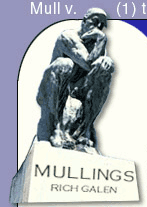|
|

|

We Call It: Freedom
 Monday November 6, 2000
Monday November 6, 2000
- The other day I got a phone call from a reporter for a weekly news magazine asking what I thought about the effects of the Internet on this election.
- The reporter had been a student at Harvard a couple of years ago when I was a panelist for a post-election look at the Internet. The group had worked on Jesse Ventura's web site and was given (or, at least, was taking) a large share of the credit for his surprise victory in the race for Governor of Minnesota. They said they were hoping we were moving toward web sites which would allow people to come together on important issues.
- I broke into the discussion and said we should name it "Kumbaya-dot-Com." Which (A) brought down the house, (B) is already a Christian music site, and (C) will probably mean I will never be invited back to Harvard.
- In my discussion with the reporter I tried to make this point: The American system works as well as it does, as often as it does, precisely because we have this kind of raucous, often grating, sometimes excessive, but always wide-open public political campaign for President of the United States.
- We call it: Freedom.
- In the 20th century, we had a great deal of experience with political movements which did not permit any discussion - amiable or otherwise - on both the extreme right and on the extreme left.
- The horribly destructive experience which was the rise of Nazism in the 1930's and led - more or less directly - to the juntas of Central and South American for three decades, was surrounded on both ends by the unconscionable brutality of the Communist movement in Europe, Asia, and the equally untenable reaction to the juntas in South and Central America.
- The common thread stitching together the cloaks of silence in which both extremes protectively wrapped themselves over the past 100 years was a prohibition on precisely the type of rough-and-tumble public debate about which too many sadly shake their heads today.
- It will not be lost on historians in the present century that those cloaks, when their populations found their collective voice, became the funeral shrouds of those very governments and movements.
- This is not only true of the political process. The same requirement for candor and rigor in discussion led to the development of the Scientific Method and the attendant advances in science and technology.
- Prior to the acceptance of the Scientific Method (as Galileo discovered after publishing his "Dialogue on the Two Systems of the World") strict adherence to established doctrine was an absolute requirement, however untested or false that doctrine might have been:
"Science is best defined as a careful, disciplined, logical search
for knowledge about any and all aspects of the universe, obtained
by examination of the best available evidence and always subject to
correction and improvement upon discovery of better evidence."
- That, from the famed classical philosopher, James Randi, who went on to say, "What's left is magic. And it doesn't work." The "Amazing" Randi could have just as easily been writing about "correction and improvement upon discovery of better evidence" in the arena of public policy and might have said, "What's left is dictatorship. And it doesn't work."
- The brief attempt by Al Gore to suggest that an open discussion regarding the future role of the U.S. military would somehow demoralize current members of the services was quickly dropped by the campaign as foolish at best and dangerous at worst.
- Similarly, the decades-long reluctance (Reluctance? How about Bates Motel dread?) of the GOP to openly discuss the future of the Social Security system seems, now, to have been in error. The spirited debate about Social Security in this Presidential campaign will certainly have a positive effect from a public policy standpoint.
- If, as generally expected, George W. Bush wins tomorrow it will be another positive step forward for our particular - and peculiar - political process.
- Not because George W. Bush should have won, but because Al Gore could have won.
-- END --
Copyright © 2000 Richard A. Galen



Current Issue |
Secret Decoder
Ring | Past
Issues | Email
Rich | Rich
Who?
Copyright �1999 Richard
A. Galen | Site design by Campaign
Solutions. | |
|

